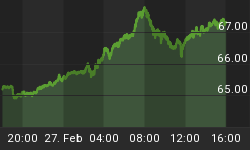The past few days have been very bad for the world's largest banks. American behemoths Citigroup and Bank of America are down about 7% each. Across the Atlantic, things are far worse. BNP Paribas, Barclays, and Banco Santander are all down 13% or more... and Société Générale is down an astounding 16%!
Some pundits warn of an overreaction and suggest this is a buying opportunity for the beat-up financials. I disagree. Rather, I think the financials should now be considered toxic assets. Caution is justified.
It was only a week ago that markets were preoccupied by a downgrade of Portuguese sovereign debt and renewed concerns that Greece will need about $100 billion by year's end to remain solvent. Now, as eyes are quickly shifting towards the first tremors of financial crisis in Italy, concerns over Greece and Portugal seem rather quaint. With an economy roughly 7 times larger than that of Greece, Italy is simply too big to bail out. Its collapse, like the sinking of a great ship, could create a vortex that drowns Europe's major banks in red ink.
In addition to exposure to sovereign debt from insolvent nations like Greece, Italy, Spain, and Portugal, major US and EU banks are also massively exposed to toxic mortgage debts, the value of which continues to be eroded by crumbling real estate markets across the West. Meanwhile, at the least opportune moment, the banks are being besieged by ill-targeted regulations devised by vindictive politicians. Finally, banks' balance sheets are skewed by ultra-low interest rates and new rules that shield them from pricing their assets to market. Beneath a thin veneer of smoke and mirrors, serious risks remain.
Intractable budget negotiations in Washington and Rome have significantly increased the likelihood of default by the West's two major economic blocs. It could be reasonably inferred that we are entering a new phase of sovereign decline: the US is within weeks of temporary default; Italy is teetering; and the consensus on Greece is shifting toward the 'German fix' of bondholder haircuts. What's worse, there are no long-term solutions readily apparent. The EU is so rigid that it's only option is to break into pieces, while the US is so pliant that its main political parties are allowed to waste precious time scoring political points at the expense of the greater good.
Since the EU does not have a formal mechanism for handling default, large European banks have been 'persuaded' for many months by the ECB and national governments to invest in the debt of financially challenged nations within the EU, most importantly that of Portugal, Ireland, Italy, Greece and Spain (PIIGS). This approach was considered more politically viable than direct investment by the ECB. Now, these European banks are left holding the bag. Since there is still no viable mechanism to deal with this debt at the sovereign level, it's no surprise that EU banks are being hit hardest in this correction. The question remains: what were they promised in exchange for 'walking the plank' into the debt abyss?
American banks have a lesser exposure to sovereign debt of the European PIIGS, but many of these institutions have made massive profits by selling insurance derivatives known as credit default swaps to their European counterparts. This is the same strategy that brought down insurance behemoth AIG in the wake of the 2008 Credit Crunch. Therefore, major American banks are far more heavily exposed to PIIGS debt than first appears. It's as if they have learned nothing. Even conservative, and supposedly bulletproof, money market funds have exposure to EU bank debt.
I do not expect all of these banks' shares to go to zero. Powerful governments are likely to resort to almost any means to salvage their grotesque central-banking/fiat-money system. Likely, that will include eventually forcing their citizens to rescue their banks again -- but this time from even larger losses. However, in the meantime, the financials' earnings and share prices could suffer dramatically.
Moreover, Italy's situation brings some larger questions to the forefront: what happens when the next round of bank bailouts bring major sovereigns to their knees? Where will you want to have your assets positioned if the EU comes apart at the seams, or the US stops paying its soldiers and seniors? What'syour plan if the central banks flood the market with even more cheap money?
Readers are strongly encouraged not to waste time gambling on shaky financials, but rather to build themselves an ark of hard assets and start rowing away from the sinking great ships of state. You don't want to be caught in the vortex when they go down.
Subscribe to Euro Pacific's Weekly Digest: Receive all commentaries by Peter Schiff, Michael Pento, and John Browne delivered to your inbox every Monday.
Click here for free access to Euro Pacific's new special report: What's Ahead for Canadian Energy Trusts?
Be sure to pick up a copy of Peter Schiff's hit economic fable, How an Economy Grows and Why It Crashes.















